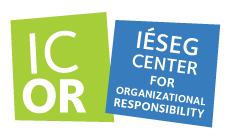ICOR represents a constructive ground to coordinate initiatives already existing at the school level and to develop innovative learning activities and educational programs. This is done in line with the commitment of the school to follow and implement the Principles for Responsible Management Education (PRME). More specifically, the School, through ICOR, aims at enabling all IÉSEG students to further build and extend upon knowledge, know-how, and savoir-être to give them the ability to develop a comprehensive, responsibility-driven vision of the role of organizations in society (i.e. traditional corporate actors and alternative organizations such as social businesses or non-profit organizations) and of the importance of the human factor within business-related organizations.
Courses offered
At the school level, ICOR members – with the help and collaboration of other lecturers and professors – develop internal initiatives that contribute to affirm the critical importance of integrating ethics, social responsibility and sustainability considerations in all business-related disciplines and of deepening the ethics, social responsibility and sustainability dimension of core courses across all programs. ICOR members contributed in recent years to the development of mandatory ethics, social responsibility and/or sustainability courses in all programs offered by the School. These courses are complemented by and a significant number of elective courses that are offered to students across all programs on topics linked to ethics, social responsibility and sustainability. Overall, next to the efforts aimed at transversally integrating ethics, social responsibility and sustainability considerations across all courses and programs, the School now offers more than 25 courses specifically dedicated to these topics. These courses include:
- Business ethics and social responsibility
- Business sustainable development
- Controlling and auditing corporate social responsibility
- Corporate social responsibility and marketing
- Creating shared value
- Environmental marketing
- Ethics: A historical and multicultural notion
- International green logistic
- Management of social innovation
- Marketing for non-profit organizations
- Money and Ethics Responsible marketing
- Social entrepreneurship
- Social marketing
- Social perspectives of information systems
- Sustainable purchasing and procurement
- Sustainable and responsible tourism
- Sustainable Development and Corporations
- …
Specific programs
Certificate in Business Ethics and Sustainable Organizations
IÉSEG master’s students in the Grande Ecole program can obtain a Certificate in Business Ethics and Sustainable Organizations. Students who register for the certificate must take a series of core courses in the field of ethics, social responsibility and/or sustainability and write a thesis on a related topic. They are also encouraged to undertake their executive internship in a function related to ethics, social responsibility and/or sustainability.
Led By Her – IÉSEG program
In November 2014, IÉSEG launched an entrepreneurship program in collaboration with the NGO HERA FRANCE (Her Autonomy, Equality and Rights) to promote the empowerment and economic autonomy of young women who have experienced violence and other forms of exploitation. The following year, IÉSEG pursued this initiative with Led By Her. The Led by Her-IÉSEG program helps these women develop an entrepreneurial outlook on their career and life choices. IÉSEG provides the expertise of volunteer professors, administrative support and facilities, and the program operates through the Paris Campus and is offered free of charge.
Manager in Vivo
Manager in Vivo is an optional module offered to students in the Grande Ecole program on a competitive basis. It provides selected students with real experience of responsible management through opportunities to coach first-year students.
Case studies
ICOR members also engage in the publication of case studies via major clearinghouses such as the Case Centre (previously ECCH) or the French CCMP (Centrale de Cas et de Médias Pédagogique) because this supports the student learning experience about ethics, social responsibility and sustainability considerations at IÉSEG School of Management and at the global level.
Examples of case studies recently published by ICOR members include:
- Goethals F., Bouten L. (2016). Paying under the table in the restaurant sector: An application of the Protection Motivation Theory, The Case Centre, case study 916-0018-1, teaching note 916-0018-8.
- Angot J., Plé L. (2015). Cresus: Preventing problem debt and over-indebtedness through a high social impact hybrid model with La Banque Postale, ECCH Case Study – The Case Center, Reference no. 715-001-8 (available at www.thecasecentre.org).
- Angot J., Plé L. (2013). Social and Economic Value Creation Thanks To Rehabilitation: The Case of IPT (Intégration Pour Tous), ECCH Case Study – The Case Center, Reference no. 713-051-1 (available at www.thecasecentre.org).
- Hota M., Keckeis, S., Kongstoft, S., Richard, O., Schneider-Archuleta, V. (2013). Green is the colour of McDonald’s France: Green is the colour of profits, ECCH Case Study – The Case Center, Reference no. 513-042-1 (available at www.thecasecentre.org).
- Hota M., Swaen V. (2013). The Quick France crisis 2011: Prior csr communication leads to post crisis opportunity, ECCH Case Study – The Case Center, Reference no. 513-121-1 (available at www.thecasecentre.org).
- Angot J., Plé L., Lescuyer T. (2012). Adidas, FLA and the Clean Clothes Campaign. ECCH Case Study – The Case Center, Reference no. 712-044-1 (available at www.thecasecentre.org).
- Bayle-Cordier, J., Perrin A. (2012). Tetra Pak France – A Global Packaging Responsibility Strategy, CCMP Centrale de Cas et de Médias Pédagogiques, Reference no. G1784 (available here).
- Hota M., Pauwels V. (2012). Coca Cola and the Olympic Games: The Spirit of Social Responsibility Governs the Spirit of the Olympics, ECCH Case Study – The Case Center, Reference no. 512-110-1 (available at www.thecasecentre.org).

